
COASTAL ENGINEERING JOURNAL
Scope & Guideline
Advancing Knowledge in Ocean Engineering
Introduction
Aims and Scopes
- Coastal Hazards and Risk Assessment:
Research involving the assessment of risks associated with coastal hazards such as tsunamis, storm surges, and extreme weather events. This includes probabilistic modeling and historical analysis to enhance understanding and preparedness. - Coastal Dynamics and Morphology:
Studies examining the physical processes affecting coastal morphology, including sediment transport, erosion, and the impacts of waves and currents on coastal structures and ecosystems. - Climate Change Impacts:
Investigations into how climate change affects coastal environments, particularly in relation to sea-level rise, increased storm frequency, and the resilience of coastal ecosystems. - Innovative Modeling Techniques:
Development and application of advanced modeling techniques, including numerical simulations and machine learning approaches, to predict coastal processes and assess the effectiveness of engineering solutions. - Marine Infrastructure and Management:
Research focused on the design, performance, and sustainability of coastal infrastructures, such as breakwaters and seawalls, and their interactions with natural coastal processes. - Ecosystem Services and Green Infrastructure:
Exploration of the role of natural solutions, like mangroves and coral reefs, in coastal protection and their contribution to ecosystem services.
Trending and Emerging
- Machine Learning and AI in Coastal Studies:
The integration of machine learning and artificial intelligence techniques for predictive modeling and real-time monitoring is gaining traction, indicating a move towards more data-driven decision-making in coastal management. - Climate Adaptation Strategies:
Research focusing on adaptive strategies for coastal communities to respond to climate change impacts, including studies on resilience-building and the use of green infrastructure, has become increasingly relevant. - Multi-Hazard Assessment Methodologies:
There is a growing emphasis on multi-hazard assessments that consider the interactions between different coastal hazards, such as storm surges and tsunamis, reflecting the complexity of coastal risk management. - Sustainable Coastal Ecosystem Management:
Research into the sustainable management of coastal ecosystems, including blue carbon initiatives and the restoration of natural habitats, is emerging as a critical area of focus. - Advanced Sensing and Monitoring Technologies:
The use of novel sensing technologies and real-time monitoring systems for waves, currents, and coastal changes is on the rise, supporting more informed and timely coastal management practices.
Declining or Waning
- Traditional Coastal Engineering Approaches:
Research that relies solely on conventional coastal engineering methods, such as rigid structures without consideration for ecological impacts, appears to be declining as there is a growing emphasis on integrated and sustainable approaches. - Historical Case Studies:
While historical analyses have provided valuable insights, the focus on retrospective case studies may be waning in favor of predictive modeling and real-time assessment methodologies. - Localized Studies on Specific Coastal Regions:
Research focusing narrowly on specific geographic areas, without broader applicability, is becoming less common as the journal encourages studies with wider implications and cross-regional comparisons.
Similar Journals

Anthropocene Coasts
Empowering Research for a Sustainable Marine FutureAnthropocene Coasts is a pivotal peer-reviewed journal published by SpringerNature, dedicated to advancing the interdisciplinary understanding of coastal systems in the context of the Anthropocene epoch. Since its inception in 2018, the journal has focused on critical issues at the intersection of Nature and Landscape Conservation, Ocean Engineering, Oceanography, and Waste Management and Disposal, achieving an impressive Q2 ranking in all these categories as of 2023. With a country of origin in Canada, this journal not only addresses significant environmental challenges, but also promotes innovative solutions and sustainable practices that resonate globally. Researchers, professionals, and students engaged in marine science, environmental studies, and engineering will find valuable insights and cutting-edge research disseminated through this open-access platform. By fostering collaboration and knowledge-sharing, Anthropocene Coasts empowers its audience to contribute to the sustainable management of coastal environments in an era of rapid change.

Physical Oceanography
Connecting Science and the SeaPhysical Oceanography is an esteemed open-access journal dedicated to the exploration and dissemination of research on the dynamic processes that govern the physical aspects of oceans. Published by the Federal State Budget Scientific Institute, Marine Hydrophysical Institute, this journal provides a forum for innovative studies and significant findings in the fields of fluid flow, geophysics, ocean engineering, and water science. With an ISSN of 0928-5105 and an E-ISSN of 1573-160X, Physical Oceanography has been granting open access to its valuable content since 2015, ensuring widespread accessibility and impact in the scientific community. Its rigorous peer-reviewed articles are crucial for researchers, professionals, and students who aim to advance their knowledge and understanding of the intricacies that govern our oceans. With a current impact factor reflecting its solid standing in the Q3 category across multiple disciplines, including oceanography and geophysics, this journal remains a vital resource for advancing oceanographic research and innovation.
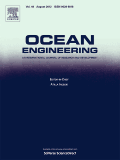
Ocean Engineering
Delivering Insights for a Sustainable Ocean FutureOcean Engineering, published by PERGAMON-ELSEVIER SCIENCE LTD, is a prestigious peer-reviewed journal that has been at the forefront of marine sciences since its inception in 1968. With an impressive impact factor and recognition in the Q1 quartile of both Environmental Engineering and Ocean Engineering, it stands as a key resource for researchers, professionals, and students alike. This journal focuses on a wide range of topics relevant to the field, including coastal engineering, marine resource management, and ocean dynamics, aiming to bridge theoretical research and practical applications. As ranked 14th in Ocean Engineering according to Scopus, it reflects the influential contributions of its articles and provides a platform for innovative discoveries that advance the field. Although not open-access, it offers diverse subscription options for accessing cutting-edge research. The journal’s ongoing legacy of publishing high-quality research continues to contribute significantly to the advancement of knowledge in ocean-related engineering disciplines.
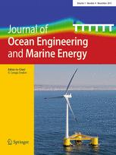
Journal of Ocean Engineering and Marine Energy
Bridging Academia and Industry for Marine SustainabilityJournal of Ocean Engineering and Marine Energy, published by SpringerNature, stands at the forefront of interdisciplinary research within the fields of ocean engineering and marine energy. Since its inception in 2015, this journal has aimed to address critical challenges and innovations in energy systems, particularly those harnessed from marine environments, thereby contributing to sustainable development and efficient resource management. With an esteemed Q2 ranking in multiple categories such as Energy Engineering and Power Technology, and Ocean Engineering, the journal serves as a vital platform for researchers, professionals, and students seeking to disseminate and engage with cutting-edge research and technological advancements. Boasting a robust readership and a commitment to open-access principles, the journal fosters a collaborative environment for the exploration of new ideas and approaches in a rapidly evolving sector. By bridging the gap between academia and industry, Journal of Ocean Engineering and Marine Energy remains instrumental in shaping the future of renewable energy solutions and environmental sustainability.
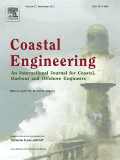
COASTAL ENGINEERING
Exploring Multidisciplinary Insights in Coastal EngineeringCOASTAL ENGINEERING is a prestigious journal published by Elsevier, focusing on the multidisciplinary fields of coastal and ocean engineering. With its ISSN 0378-3839 and E-ISSN 1872-7379, this journal has established a reputation for contributing high-quality research that addresses the dynamic challenges faced in coastal environments. Notably, it holds a remarkable Q1 ranking in both Environmental Engineering and Ocean Engineering categories, placing it in the top tier of academic journals with an impressive Scopus rank of #6 among 105 in Ocean Engineering and #28 among 197 in Environmental Science. The journal spans from its inception in 1973 to the present, with valuable insights that shape future developments in coastal management, sustainability, and engineering practices. Although it does not currently offer an Open Access option, its impact on advancing knowledge in the field is significant, making COASTAL ENGINEERING an essential resource for researchers, professionals, and students devoted to the preservation and enhancement of coastal and marine environments.

Water Waves
Pioneering Insights in Mathematical ModelingWater Waves is a leading academic journal dedicated to advancing research in the fields of analysis, applied mathematics, computational mathematics, and modeling and simulation. Published by SPRINGERNATURE, the journal has positioned itself as a vital resource for researchers and professionals who are exploring the dynamic behaviors of water waves and their applications across various scientific disciplines. With an ISSN of 2523-367X and an E-ISSN of 2523-3688, the journal provides a robust platform for disseminating high-quality research findings, featuring works that reflect innovative methodologies and significant contributions to the understanding of water dynamics. With its publication corridor extending from 2019 to 2024 and achieving a commendable Q2 quartile ranking in multiple mathematics categories for 2023, "Water Waves" emphasizes its commitment to fostering scholarly excellence. Despite its evolving status, the journal remains accessible to a wide audience, underscoring its significance in shaping the discourse in its respective fields, while also providing vital insights and fostering collaboration among researchers, academicians, and students alike.
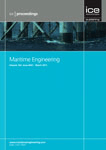
PROCEEDINGS OF THE INSTITUTION OF CIVIL ENGINEERS-MARITIME ENGINEERING
Pioneering Research in Ocean Engineering.PROCEEDINGS OF THE INSTITUTION OF CIVIL ENGINEERS-MARITIME ENGINEERING, published by Emerald Group Publishing Ltd, is a leading journal in the field of Maritime Engineering. With a reputable ISSN of 1741-7597 and an E-ISSN of 1751-7737, this journal has established itself as a cornerstone for researchers, professionals, and students keen to explore the complexities of ocean engineering. Operating primarily from the United Kingdom, it has made significant contributions to the advancement of the maritime industry since its inception, covering research from 2001 to 2024. The journal currently holds a Q3 ranking in Ocean Engineering as classified by Scopus, where it ranks 21st among 105 journals in the category, placing it in the 80th percentile, which highlights its influence and relevance in contemporary marine research. Through a rigorously peer-reviewed process, the journal publishes innovative and high-quality articles that encompass broad aspects of maritime engineering, including design, construction, and sustainability, thus serving as a vital resource for those engaged in this dynamic field. By fostering dialogue among professionals and providing access to cutting-edge research, the PROCEEDINGS OF THE INSTITUTION OF CIVIL ENGINEERS-MARITIME ENGINEERING continues to shape the future of maritime engineering practice and education.

Journal of Ocean University of China
Connecting Scholars to Shape the Future of the SeasThe Journal of Ocean University of China, ISSN 1672-5182, is a premier academic journal dedicated to advancing the fields of Ocean Engineering and Oceanography. Published by the esteemed Ocean University of China, the journal serves as a vital platform for researchers, professionals, and students to disseminate groundbreaking findings and foster collaboration in marine science and engineering. With a commitment to quality, the journal currently holds a Q3 ranking in both Ocean Engineering and Oceanography as of 2023, indicating its significant contributions within the scientific community. The journal's scope encompasses a wide range of topics including marine technology, ecological studies, and coastal management, all aimed at enhancing the understanding and utilization of oceanic resources. Although currently not Open Access, it continues to attract submissions from renowned scholars, ensuring a diverse and innovative range of research. By providing access to cutting-edge research and practical insights, the Journal of Ocean University of China plays a critical role in shaping the future of ocean sciences and engineering.

Journal of Operational Oceanography
Charting New Waters in Operational OceanographyThe Journal of Operational Oceanography, published by Taylor & Francis Ltd, stands as a pivotal platform within the field of oceanography, focusing on the integration of operational practices, technology, and scientific research. With a strong impact factor and a notable Q2 quartile ranking in the category of Earth and Planetary Sciences, this journal offers researchers, professionals, and students a vital resource for disseminating new knowledge and innovative methodologies related to ocean studies. Covering a range of topics from marine data analysis to the application of oceanographic principles in sustainable practices, the journal’s content is crucial for advancing understanding in this dynamic field. Operating since 2008 and continuing through 2024, it is dedicated to fostering collaboration and dialogue among the scientific community, ensuring accessibility to essential findings that drive informed decision-making in marine science. With its commitment to high-quality, peer-reviewed articles and a ranking in the top 10th percentile of its category, the Journal of Operational Oceanography is an indispensable resource for those looking to make significant contributions to marine research.
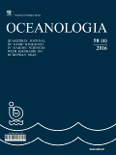
OCEANOLOGIA
Unveiling the Mysteries of the Deep BlueOCEANOLOGIA, a distinguished academic journal published by the Polish Academy of Sciences, Institute of Oceanology, serves as a pivotal platform for researchers and professionals in the fields of Aquatic Science, Oceanography, and Ocean Engineering. Established in 1973 and transitioning to Open Access in 2011, this peer-reviewed journal promotes the dissemination of high-quality research across its diverse scope of ocean-related topics, aligning with its commitment to advancing marine science. With a notable impact factor underscored by its positioning in the Q1 and Q2 quartiles of recognized categories, OCEANOLOGIA stands out with impressive Scopus Rankings, including 49/247 in Aquatic Science and 24/105 in Ocean Engineering, reflecting its significance in the global research landscape. The journal's dedication to publishing cutting-edge studies ensures that it continues to influence both academic discourse and practical applications in ocean-related fields, making it an essential resource for students, researchers, and professionals aiming to contribute to the advancement of oceanic studies.